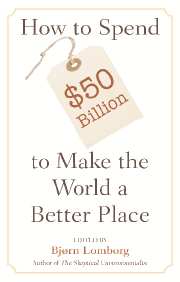Book contents
- Frontmatter
- Contents
- Contributors
- Introduction
- 1 Meeting the Challenge of Global Warming
- CLIMATE CHANGE – OPPONENTS' VIEWS
- 2 Communicable Diseases
- COMMUNICABLE DISEASES – OPPONENTS' VIEWS
- 3 The Challenge of Reducing the Global Incidence of Civil War
- THE CHALLENGE OF CONFLICTS – OPPONENTS' VIEWS
- 4 Toward a New Consensus for Addressing the Global Challenge of the Lack of Education
- THE CHALLENGE OF LACK OF EDUCATION – OPPONENTS' VIEWS
- 5 The Challenge of Poor Governance and Corruption
- THE CHALLENGE OF POOR GOVERNANCE AND CORRUPTION – OPPONENTS' VIEWS
- 6 Hunger and Malnutrition
- HUNGER AND MALNUTRITION – OPPONENTS' VIEWS
- 7 Population and Migration
- POPULATION: MIGRATION – OPPONENTS' VIEWS
- 8 The Water Challenge
- THE WATER CHALLENGE – OPPONENTS' VIEWS
- 9 Subsidies and Trade Barriers
- SUBSIDIES AND TRADE BARRIERS – OPPONENTS' VIEWS
- Expert Panel Ranking
- Index
SUBSIDIES AND TRADE BARRIERS – OPPONENTS' VIEWS
Published online by Cambridge University Press: 27 July 2009
- Frontmatter
- Contents
- Contributors
- Introduction
- 1 Meeting the Challenge of Global Warming
- CLIMATE CHANGE – OPPONENTS' VIEWS
- 2 Communicable Diseases
- COMMUNICABLE DISEASES – OPPONENTS' VIEWS
- 3 The Challenge of Reducing the Global Incidence of Civil War
- THE CHALLENGE OF CONFLICTS – OPPONENTS' VIEWS
- 4 Toward a New Consensus for Addressing the Global Challenge of the Lack of Education
- THE CHALLENGE OF LACK OF EDUCATION – OPPONENTS' VIEWS
- 5 The Challenge of Poor Governance and Corruption
- THE CHALLENGE OF POOR GOVERNANCE AND CORRUPTION – OPPONENTS' VIEWS
- 6 Hunger and Malnutrition
- HUNGER AND MALNUTRITION – OPPONENTS' VIEWS
- 7 Population and Migration
- POPULATION: MIGRATION – OPPONENTS' VIEWS
- 8 The Water Challenge
- THE WATER CHALLENGE – OPPONENTS' VIEWS
- 9 Subsidies and Trade Barriers
- SUBSIDIES AND TRADE BARRIERS – OPPONENTS' VIEWS
- Expert Panel Ranking
- Index
Summary
In his challenge paper, Kym Anderson makes a strong case for maximum liberalization of trade, not only as a good in itself, but also as a way to contribute to the other high-priority challenges. Both opponents agree that free trade has economic benefits, but have concerns about how these might best be generated and shared.
Arvind Panagariya whole heartedly supports Anderson's case for trade liberalization to be the highest priority among the challenges and, indeed, considers it essential if all the others are to be met. Nevertheless, he has some critical points to make. In particular, he thinks that the case would be stronger if more details were given of the nature and size of some of the barriers. Also, benefits are not uniformly distributed: The impact on some developing countries would actually be negative.
Anderson makes the case for liberalization on the basis of broad generalizations, where cause (liberalization) inevitably leads to the desired effect (increased growth). In Panagariya's view, this relationship cannot be guaranteed, and he sees openness instead as being necessary, but not sufficient, for sustained rapid growth.
Looking at the first of Anderson's identified opportunities – unilateral liberalization – Panagariya sees ample evidence for the benefits of this, citing in particular the dramatic improvements in growth resulting from India and China following such a path.
- Type
- Chapter
- Information
- How to Spend $50 Billion to Make the World a Better Place , pp. 160 - 164Publisher: Cambridge University PressPrint publication year: 2006



